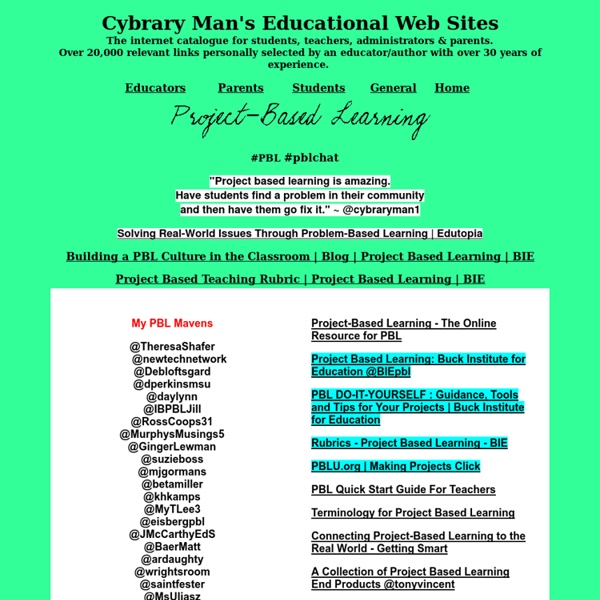



http://cybraryman.com/projectbasedlearning.html
Related: COLLECTION: Project-Based Learning (PBL) ResourcesScaffolding the PBL Shift I remember my first year teaching freshmen Global Studies at a brand new Project Based Learning school. I was so excited to allow students to pursue their own paths in student centered learning. I gave them open-ended topics like imperialism to pursue with little guidelines and no rubrics. I thought the students could research and figure out what interested them and what was important all on their own. Fairly soon the students started coming to me and begging for guidance, and it wasn’t limited to struggling students. The most vocal students were the ones who had gotten all A’s in traditional classes.
Wright'sRoom I love project-based learning. Why? Because my students do. Some of my favourite projects are the Biology 30 projects due at semester’s end. These aren’t the only projects we create throughout the semester; we also create a number of digital products too. A PBL Project is Like the Hero’s Journey I’ve been meaning to write this post after hearing an idea at PBL World 2015 in the keynote by Ramsey Musallam, an amazing speaker and high school chemistry teacher. Now that PBL World 2016 is almost upon us, I thought I’d better get this done so I can be ready to blog about this year’s events and ideas. Ramsey likened the learning cycle that happens in PBL to the classic “hero’s journey” first explained by mythologist Joseph Campbell in The Hero with a Thousand Faces (1949). Campbell described the basic narrative pattern as: A hero ventures forth from the world of common day into a region of supernatural wonder: fabulous forces are there encountered and a decisive victory is won: the hero comes back from this mysterious adventure with the power to bestow boons on his fellow man.
Talking About Text Structure in the PBL Classroom Project-based learning is often associated with STEM learning, but PBL is a powerful context for literacy learning as well. Many research-supported practices for developing literacy can be seamlessly embedded into projects. A meaningful and engaging context, as in PBL, can make instruction in research-supported practices even more effective (Guthrie et al., 2004; Guthrie et al., 2008). Strong readers pay more attention than weaker readers to how texts are structured or organized. Fortunately, paying more attention to text structure is something that we can teach to all readers. Research shows that this practice helps many readers, even young children and those with learning difficulties (Gersten, Fuchs, Williams, & Baker, 2001; Shanahan et al., 2010).
TLC Middle School (opening August 2013) We are running affordable summer camp sessions from 8:45-noon during the week of July 8-12 in Durham, NC. Click here for details. Student applications for 2013-14 are now available;Please click this link for the 2013-14 TLC Application. TLC in the Durham Press Read this article about TLC in the Duke student newspaper.Read another article about TLC from the Durham Herald-Sun. For more information about TLC, please contact Steve Goldberg – Steve [at] Trianglearning.org (note that it’s not Trianglelearning — there’s a shared “le”) Please click here for a 2-page Executive Summary describing TLC.
New Study Shows the Impact of PBL on Student Achievement Does project-based learning (PBL) raise student achievement? If you’ve been involved in PBL for long, you’ve undoubtedly encountered this question. Over the last few years as education researchers at University of Michigan and Michigan State University, we have worked to address this question through a large study of the effects of PBL on social studies and some aspects of literacy achievement in second-grade classrooms. We call this initiative Project PLACE: A Project Approach to Literacy and Civic Engagement. About the Study In our study, we randomly assigned second-grade teachers in high-poverty schools that had low performance on state tests to two groups.
PBL School Rubric May , 2014 Project based learning is a teaching learning methodology that has been widely praised for its efficacy in enhancing learning achievements.The premise underlying PBL revolves around getting students engaged in authentic learning events through the integration of mini-projects in class. These projects can be as short as one day and as long as a year. However, there is a difference between mere projects and project based learning. This table from Teachbytes provides a great illustration of the nuances between the two concepts. Check out the full graphic from this page.
Life in a Inquiry Driven, Technology-Embedded, Connected Classroom: Science I teach in an inquiry, project-based, technology embedded classroom. A mouthful, I know. So what does that mean? It means I lecture less, and my students explore more. It means that I create a classroom where students encounter concepts, via labs and other methods, before they necessarily understand all the specifics of what is happening.